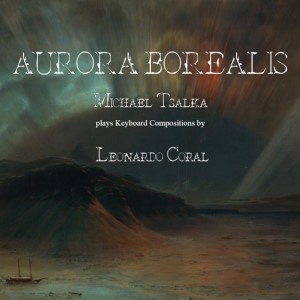
Leonardo Coral (b.1962)
Aurora Borealis
Harpsichord Suite (2010)
Piano Sonata No.4 (1997)
Perceptions for positive organ (Fortepiano version) (2010)
Constellations (2012)
Elemental Visions; Fortepiano Sonata No.9 (2012)
Michael Tsalka (fortepiano and harpsichord)
rec. 2024, Fortepiano Atelier, Gijs Wilderom, Bergen, Netherlands
Tempus Clasico TC-203 [48]
Leonardo Coral is a leading Mexican composer and his works are frequently performed and recorded. He has enjoyed a harmonious working relationship with pianist and harpsichordist Michael Tsalka, who first met Coral when he was working from 2009 to 2011 as Professor of Harpsichord and Chamber Music at the National Center for the Arts in Mexico. Now, Tsalka has recorded a number of Coral’s invigorating, classically-conceived but very personal works which range in compositional date from 1997 to 2013.
Coral writes stylishly for the harpsichord as his baroque-tinged Suite shows. It was composed for Tsalka. The vertiginous wave-like animation of the second Presto movement prefaces a Sarabande which manages to fuse brittle as well as eloquently expressive writing and not make either element sound incongruous. The terse toccata that ends the suite enshrines vividly motoric writing. The earliest work here is the Piano Sonata No.4, a three-movement work performed on the fortepiano which, with its short delay, grafts a crisp immediacy to the music as well as an aural quality I can best describe as ‘thwacking’. There’s also something quizzical about some of the writing amidst the express delivery in the opening Allegro con brio. The slow movement never quite settles and this gives it a probing spirit whereas the finale is the most abrasive movement, chromatic in places and terse.
Perceptions was composed for positive organ but is heard in its fortepiano version. This is a quite colouristic piece, darting and energetic, employing repetition and in the engaging finale, a Toccata, wrong-footing the listener with its crisp independence. As with so many Toccatas, as well as the virtuosity involved, there’s also something rather obsessive about it. Constellations is a Theme and a sequence of 20 taut variations lasting eight or so minutes. The drifting harmonies give it a slightly impressionistic feel but the variations are built with great assurance. The other work dedicated to Tsalka is the Fortepiano Sonata No.9 titled ‘Elemental Visions’ composed in 2013. Each movement bears a descriptive title – Noche or Aurora boreal, this last gives its name to the album’s title – and the sonata ingeniously marries terseness with lyricism, the nocturnal with the twilit, tartness with quiet reverie.
Tsalka is an assured and trusted guide to this music, which is rooted in traditional models but bears the stamp of individuality and an ear for sonority and for rapid contrasts. If elements sound French, then I don’t think too much should be made of that. Coral is sympathetic to formal structures and to focusing on their essence and both baroque and impressionistic structures offer him different but analogous avenues for exploration and to generate continual sonic interest in his music.
Jonathan Woolf
Availability
This recording has very limited availability as a physical release, but is accessible through various streaming services.


















